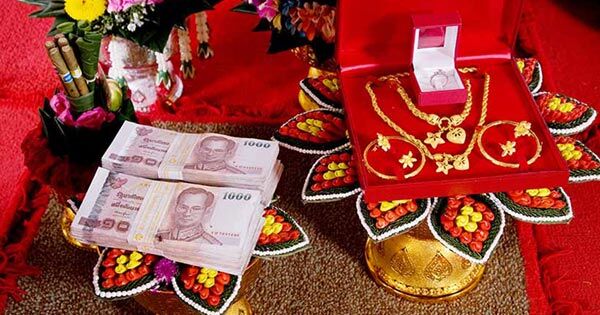What is a Sin Sod and why is it a part of Thai culture?
Dowry in Thailand or “Sin Sod” is an important cultural tradition where the groom pays a sum of money to the bride’s family on the day of their wedding. This is to assure the bride’s family that the groom can financially support and care for their daughter as well as show gratitude that he is grateful to have the bride as his wife. Considered to be a long upheld tradition for marriage in Thailand dating back centuries ago, it is a symbolic part of Thai culture, although treated lightly by Westerners. The term “Sin,” means riches, while “Sod” is the act of holding on to something.
Thai families value financial security, and the groom is expected to prove they’re capable of providing it before marriage for his family. In some families, the groom can be expected to move into the in-laws’ family home to maintain or manage a business or handle financial problems, as well as taking care of any relatives. All this provides a support system and overall closeness in a Thai family. In the case of inheritance, the family’s home and any land are also normally passed on to the children who are female, meaning the husband of a daughter would be expected to maintain these benefits.
How much to pay for a Thai dowry
Depending on the social status of the bride’s family as well as her education level, the amount of Thai dowry can vary greatly case by case. A typical dowry for a Thai wife coming from a middle-class family and is educated with a university degree in Thailand can be worth about at least 100,000 to 300,000 baht. Grooms can be expected to pay more for a bride of higher status or education, sometimes up to 500,000 to 1 million baht, especially if they have been educated abroad. High-profile marriages involving multi-billionaire families can see dowries up to 1 billion baht! Conversely, if the bride is a Mae Mai, which is a Thai term for a woman who is widowed or divorced then no dowry will be required. In Thai culture, such women are not viewed favorably as they are considered “spoiled or ruined”, and the perception is especially worse if she comes along with her children of a former marriage.
Anyone planning a wedding in Thailand should understand that a sin-sod has been deeply rooted in Thai culture for many generations. Westerners often disagree with this concept or refuse them altogether as it may seem backward or outdated, it is not recommended to have an argument about this issue with the family of your Thai bride. While there are no legal consequences for not providing a sin sod, failure or refusal to do so can leave the bride’s family to feel insulted, and they will likely harbor some resentment or even hold a grudge over this incident for quite some time.
What are the customs involved after giving a dowry?
To negotiate the Sin Sod, the groom is to first approach the Thai parents with Tong Mun, an abstract term that roughly translates to “gold engagement”. It can essentially refer to a 24-karat jewelry for the bride, similar to an engagement ring, but can be anything with value. Gifts offered to the bride during the engagement other than gold are instead called Khong Mun or an “engagement gift”. When the Tong Mun or Khong Mun has been agreed upon, a ceremony will be held at the bride’s own family home to receive the gift. This ceremony is referred to in Thailand as “Phitee Mun,” or engagement ceremony in which accepting family members will attend. If the bride and groom finally become an engaged couple, their status would change and they will be called a “Koo Mun”, which is the Thai term for a fiance.
Phitee Mun is also another important part of Thai tradition. At the end of this ceremony, each attendant will tie a string around the bride and the groom’s hand, further showing their acceptance and giving their blessings. This procedure is called “Bai Sri Soo Kwan” which comes before the actual wedding. The couple will continue to maintain their status as a Koo Mun several weeks after the Bai Sri Soo Kwan and also after the dowry is received until the actual wedding registration. Just like a prenuptial agreement, providing a dowry in Thailand is not mandatory, but it is simply a common tradition amongst the Thai families. A Thai law firm specializing in family law can help you process your marriage registration and provide you with guidance with regards to the Thai dowry system.
Contact Us
LEAVE US A MESSAGE
For information and assistance on how to register your marriage in Thailand, please fill out the form below and send it to us.



































